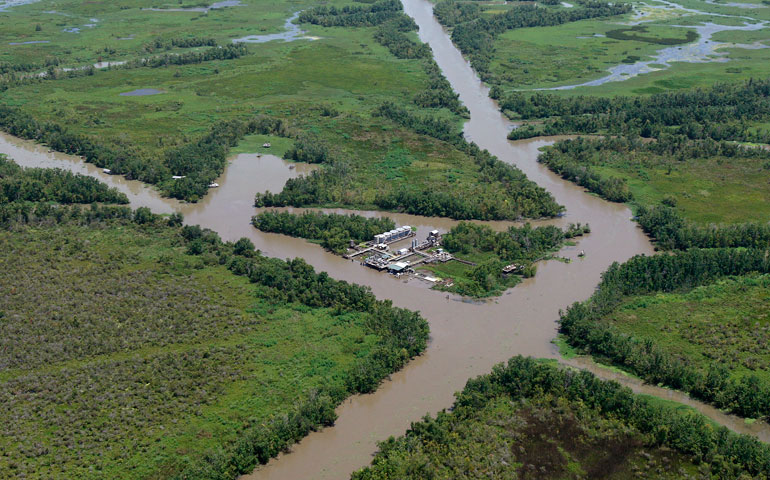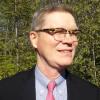
An oil facility is seen in the middle of canals dug for pipelines on the coast of Louisiana in 2010. (AP Photo/Patrick Semansky)
Now, more than ever, we need a transformation from an egocentric worldview to an ecologically centered social, political, economic and moral imagination. Pope Francis offers, in his encyclical "Laudato Si', on Care for Our Common Home," a vision for integral human and ecological development that can nurture full flourishing for all forms of life.
And yet, this Earth Day, we are at an impasse, what theologians and mystics refer to as a limit situation, where there seems to be no way out, where old paradigms fail to assuage our desires to possess more things, security and comfort. We are in a time of profound crisis and transition.
The wisdom we need today comes not from presidential candidates, political pundits, or the rich and powerful, but from people who are marginalized, mystics, and a wounded Earth crying for life.
Indeed, the chaos, incivility, inhumanity and paucity of vision displayed in the current U.S. political cycle reveal symptoms of a deeper spiritual malaise. There seems no way to lay the ax to mounting absurdities as some candidates and their followers refuse to follow basic norms of truth and intelligence.
We lack the long-term vision we need for a sustainable future. A recent study in the journal Nature Climate Change, for example, examines the need to broaden our perspective of human-driven climate change from a narrow view of the last two centuries to a long-term context that includes the past 20 millennia, when the last Ice Age and human civilization first developed, and the next 10 millennia, when "the projected impacts of anthropogenic climate change will grow and persist."
The study underscores how public policy decisions made in the "next few years to decades" will have "profound impacts" on global ecosystems and human societies for 10,000 years and beyond. It predicts that even if global leaders and societies are able to achieve reductions in carbon emissions held below the 2-degree-Celsius warming threshold, sea-level rise will still force one-fifth of the global population to migrate inland, away from coastal cities. Building more walls to prevent migration or flooding will only exacerbate our deadly predicament.
In my beloved south Louisiana, we know the local causes of coastal erosion. Too many places like Yellow Cotton Bay, Drake Bay and English Bay no longer exist and have been removed from maps by the National Oceanic and Atmospheric Administration.
As south Louisiana journalist Bob Marshall explains in a recent radio series "The Louisiana Coast: Last Call," we have essentially destroyed in one lifetime -- 70 years -- what it took nature more than 6,000 years to create. Not far from revelers in the French Quarter of New Orleans, as Marshall puts it, we are in the "fight of our life."
"It’s been a one-two punch," Tulane University environmental law professor Oliver Houck says in an interview on the series. “‘If you have a patient and you cut the patient off from food and water, which is what the levees do -- they knock out the sediments and the low levels of nutrients necessary to maintain the marsh -- and you knock off the water, freshwater in-flow -- the patient’s already weak, right? Reeling, and not in good shape. Then you cut it up with knives? That patient is gone. We have 10,000 miles of oil and gas canals out there -- and we’re building more each year, just as if they weren’t a problem. They have sliced and diced and cut up the marsh to a fare-thee-well. It can’t recover with those kinds of wounds."
Paradoxically, as Carmelite contemplative Sr. Constance FitzGerald explains, impasse itself can be the condition of the possibility for transformation if "the experience of impasse is fully appropriated within one’s heart and flesh with consciousness and consent; if the limitations of one’s humanity and human condition are squarely faced and the sorrow of finitude allowed to invade the human spirit with real, existential powerlessness."
She notices that in our North American culture we are not well-prepared to give up our perceived control over the Earth.
We need to admit with Francis that we are made of dust of the Earth (Genesis 2:7) and that from this ground of humility we need to surrender to the mystery within us and the whole of creation.
Then we may be opened and transformed to perceive and enact an ecologically centered and God-centered way of being.
Indeed, Jesus Christ imitates the way to journey nonviolently through impasse, even death, by complete dependence upon the love of Abba and the Holy Spirit. God alone transforms the crucifixions of our current impasse into new life when we throw ourselves over to mystery.
Then we may realize the new life promised in Jesus’ prayer to Abba, that God’s will be so fully realized through us that every moment, every place, on Earth is called heaven.
[Alex Mikulich is an anti-racist Catholic theologian who serves as assistant director in the Office of Mission and Ministry at Loyola University New Orleans.]




